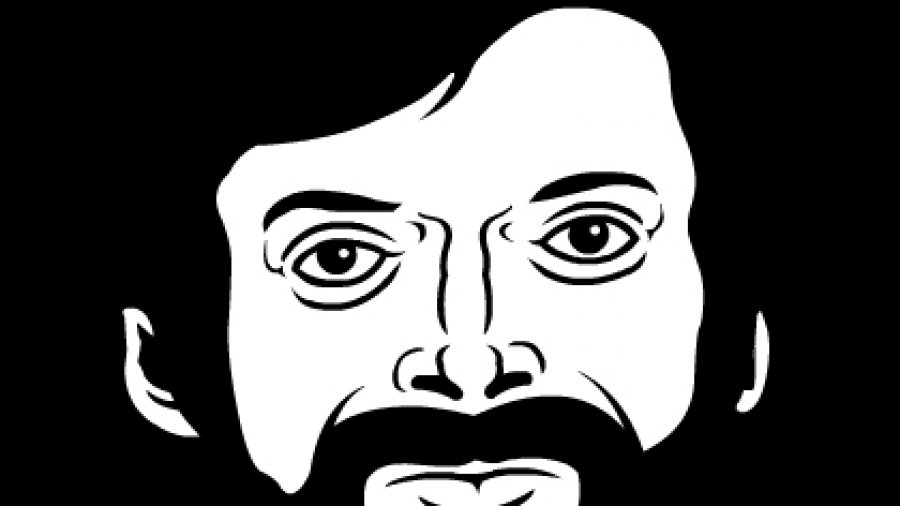“We have to create culture, don’t watch TV, don’t read magazines, don’t even listen to NPR. Create your own roadshow.”
Terence McKenna is one of those cult-famous, societal-fringe figures of whom the majority of people have never heard. He’s also someone whose views probably have a polarizing effect on anyone who encounters them. At the very least, though, Terence was an exceptionally original thinker, and those who explore a fraction of his work will note his erudition and incredible ability to articulate his thoughts.
McKenna was an American philosopher and ethnobotanist who passed away in the year 2000. He was known for possessing expertise on a broad range of subjects including history, biology, geology, botany, and ecology. He toured and lectured extensively on everything from language and science to shamanism and extraterrestrials, developing a sizable and enthusiastic following.

The late Terence McKenna. Image via Wikimedia Commons.
His controversial status is in large part due to his vocal advocacy of mind-altering substances. McKenna was a well-known psychonaut–one who explores consciousness through the ingestion of psychedelic hallucinogens–and a staunch proponent of the use of naturally occurring psychoactive compounds.
Obviously this latter aspect of McKenna’s legacy is an immediate turn-off to many. For a major sector of the population, the colossal stigma surrounding psychedelic substances is sufficient reason to lambaste the views of a well-known user. I, however, am not so quick to dismiss such a person, especially one as lucid, compelling, internally consistent, and dedicated to free inquiry as Terence McKenna.
McKenna’s Views on Mass-Consumerist Culture
I’ve delved into hours of McKenna’s lectures, and I am particularly interested in his ideas on culture. When McKenna speaks of culture, he seems to refer primarily to modern, mass-consumerist culture, so keep that in mind.
McKenna held a rather unfriendly position toward culture that can be summed up succinctly by one of his most famous quotations: “Culture is not your friend.” McKenna saw modern culture as a sort of engine detached from the interests of the individual and serving the manipulative, power-focused agendas of various institutions and wealthy individuals.
The following short video contains a portion of one of his lectures in which he addresses culture. I encourage you to watch it now (I will transcribe and elaborate on its central ideas below):
What Civilization is and What it Could be
McKenna certainly had a way of poetically articulating his ideas, and the video opens with what I feel is one of Terence’s most memorable metaphors:
“What civilization is is 6 billion people trying to make themselves happy by standing on each other’s shoulders and kicking each other’s teeth in. It’s not a pleasant situation. And yet you can stand back and look at this planet and see that we have the money, the power, the medical understanding, the scientific know-how, the love, and the community to produce a kind of human paradise.”
With this statement McKenna addresses the hyper-competitive environment that is symptomatic of the modern capitalistic socioeconomic paradigm. Our culture has a tendency to glorify competition, and many would argue that competition drives innovation and “progress” (a slippery word). I doubt McKenna would argue that competition has not been essential to the invention of our modern world, but he seems to step back and ask, “Yes, but when will it be enough?”
McKenna suggests that we’ve reached a stage of technological advancement and knowledge that would allow us to “produce a kind of human paradise.” This declaration sounds vague and idealistic, but based upon what I know of McKenna, I assume that by “human paradise” he envisioned something like a drastic change in the work paradigm, an elimination of poverty and starvation, a great reduction in disease and illness-related death, the end of war, and a much more palpable sense of a world community.
“Culture is Not Your Friend”
These items might sound far-fetched, but McKenna is not the first to suggest that such a situation is possible with our modern technology. R. Buckminster Fuller comes to mind as another prominent thinker who held similar views. After making this statement, McKenna elaborates on what he believes prevents us from attaining this state of affairs–namely, a lack of significant resistance to the poor leadership, dehumanizing values, and damaging cultural “control icons” that he perceives in the world. He states:
“Culture is not your friend. Culture is for other peoples’ convenience and the convenience of various institutions, churches, companies, tax collection schemes, what have you. It is not your friend. It insults you. It disempowers you. It uses and abuses you. None of us are well-treated by culture.”
[…]
But the culture is a perversion. It fetishizes objects. It creates consumer mania. It preaches endless forms of false happiness, endless forms of false understanding in the form of squirrelly religions and silly cults. It invites people to diminish themselves and dehumanize themselves by behaving like machines.”
Modern World as Dystopia?
McKenna holds that modern culture is centered around the agendas of those who are almost certainly not you. He believes that culture diminishes and dehumanizes the vast majority of the population by inviting them to unreflectively reinforce its models.

Artist’s rendering of Terence McKenna aka “Uncle Terence”. Credit: “thöR (Creative Commons)
McKenna seems to suggest that instead of focusing on creating the type of world that is possible, we are caught up in a game of culture–a robotic pursuit of fetishized objects and false visions of a proverbial light at the end of the tunnel.
To some, this view may seem rather grim and dystopian. I don’t see it that way. I see it as a warning that remains pertinent in 2013. The culture McKenna refers to does exist, and its effects are far-reaching and potentially insidious. However, I know that there are many, many people who are aware of this cultural game and do not conform to its status quo, who resolve to try to choose their own way of life and who see through the glitzy media-images.
Simply by being among this latter group of people, I think we’re doing the work that McKenna believed needed to be done–the work of resisting the damaging and dehumanizing aspects of modern consumerist culture. The mere realization that we are culturally conditioned to behave in certain ways is a sufficient catalyst to begin assuming a more active and reflective role in deciding how to live and act.
I see nothing wrong with being a cultural participant, but it should be our goal to develop a deeper awareness of the ideals our culture would have us pursue. When we understand the culture’s vision for our lives, we can continue to exist within our given society while challenging its flaws in subtle ways. We can deliberately express ourselves in forms that disrupt its norms, and we can consciously choose which aspects of it are worth partaking in. In this way, we become active constituents of culture, shifting and re-imagining its values, contributing to the gradual creation of a culture that we can call our “friend”.
McKenna Suggests We Must Create Culture
McKenna was certainly a vocal critic of mass culture, but to his credit, he was also quite vocal about offering alternatives. He believed strongly in the importance and utility of art, the primacy of felt experience, and the need to create our own values and alternative spaces for expression.
I’ll leave you with one last quote from another of Terence’s lectures that is especially poignant here. He was a frank and opinionated speaker, to be sure, but don’t let his style put you off. Terence was also always quick to check his own views and make light of his position. He didn’t want to insult people–he just wanted us to ask questions. This message from beyond the grave is valuable to each of us; ponder it with an open mind:
“We have to create culture, don’t watch TV, don’t read magazines, don’t even listen to NPR. Create your own roadshow. The nexus of space and time where you are now is the most immediate sector of your universe, and if you’re worrying about Michael Jackson or Bill Clinton or somebody else, then you are disempowered, you’re giving it all away to icons, icons which are maintained by an electronic media so that you want to dress like X or have lips like Y. This is shit-brained, this kind of thinking. That is all cultural diversion, and what is real is you and your friends and your associations, your highs, your orgasms, your hopes, your plans, your fears. And we are told ‘no’, we’re unimportant, we’re peripheral. ‘Get a degree, get a job, get a this, get a that.’ And then you’re a player, you don’t want to even play in that game. You want to reclaim your mind and get it out of the hands of the cultural engineers who want to turn you into a half-baked moron consuming all this trash that’s being manufactured out of the bones of a dying world.”
― Terence McKennaIf you enjoyed this piece, you may want to check out the ways to grab free updates from Refine The Mind.
P.S. I had a bit of writing published on Tiny Buddha today as well. It’s a more personal piece on being abroad and not overlooking what’s nearest to you. It’s quite relevant to Thanksgiving. You can read it here if you like.
About Jordan Bates
Jordan Bates is a Lover of God, healer, mentor of leaders, writer, and music maker. The best way to keep up with his work is to join nearly 7,000 people who read his Substack newsletter.





Great piece man! Mckenna is a huge influence in my life as well! Great to see other spreading the word.
Thanks, Nicholas! Awesome to hear from another person who digs McKenna. Regardless of his views, I’ve always found his voice and general persona to be soothing and uplifting.
I’m glad he existed, and I’m glad I can spread the word about him. Cheers and take care. Stop back sometime if you feel so inclined.
Hello, good piece. Funny, it was sent to me by a guy I met upon my return to Canada – a recruiter who helped me get a job. This is after living in Seoul for nearly 8 years. Funny that I come upon your site and writings after leaving the country. I enjoyed the piece and I would argue that to many, this should be common sense – an hour in front of a television is an hour of sitting down to be programmed (watch a few commercials and any “reality tv”). Here in Canada, all you can hear about… Read more »
Hey Stuart, Woah, that is wild that you would come upon the site of a fellow Korea-going ex-pat just after leaving the country. Very cool. Glad to hear you enjoyed the piece. As much as I wish this were common sense, it simply isn’t. I feel that the majority of people have very little awareness of the extent to which many, many people are lobbying to place ideas into their mind or to reinforce preexisting ways of thinking. At least in my experience. Gah — the ‘Black Friday’ brouhaha kills me too. It’s humorous on the exterior but it’s deeply… Read more »
Great stuff. There is a particular lecture you recommend? There are hundred hours of material online, don’t know where to start!
Hey sntaln!
Thank you. I’d personally recommend ‘Appreciating Imagination’, but McKenna’s corpus is so vast that it’s hard to know what would interest you.
I’d recommend perusing some of his shorter YouTube clips to see what sparks your interest. Take care, and thanks for dropping a comment!
I think that confirmation bias plays a large role in how we perceive things as large and complex as our culture. It’s easy to find and focus on examples of good, and conversely on examples of bad. Although certainly I personally think that the western world as a whole, from my limited knowledge of it’s collective culture, is heading in the wrong direction, I don’t consider it to be quite at the repetitious robotic level yet. I have to say that I agree that the idolization of individuals is ridiculous, and that we should create our own culture. That the… Read more »
Ragnar, I think that was an astute assessment of the article. Confirmation bias definitely plays a role. Glad to hear that your instinct was to agree with a lot of what was in the post, though. I’ve always found McKenna to be lucid, persuasive, and even prescient. He was a great thinker. As far as what I’d recommend for reading, I’ve only read a couple essays online. Most of what I’ve encountered have been his lectures. I’d recommend the lecture series ‘Appreciating Imagination’ and would also suggest perusing some shorter clips on YouTube. But, I will say that the first… Read more »
Create a rock and roll band with me. That’s what I recommend.
I’m with you (for the most part) on your thoughts on TV. I haven’t watched television for a couple years, though I’m not so quick to completely dismiss people who do. I agree that it can be a lot of mind-numbing drivel, but to label everyone who watches as “sheeple” may be going a touch too far. As we’ve agreed, telling people how to live is not something we’d like to do, and dismissing a certain hobby/interest seems akin to saying, “You should not live this way!” It’s another difficult topic, and it’s related to my reply to you on… Read more »
Thanks, Brandon! I’m such a fan of McKenna that I needed to share some of his ideas. And thanks for linking to the Psychedelic Salon. That’s where I’ve listened to some of Terence’s lectures. Cheers.
Features like this, directing interest and attention to ‘Terence McKenna’s perspective’ (i.e. ‘theorizing’ and ‘philosophy’ etc) abound on internet. Seems they mainly reflect his persisting influence and impact in ‘fringe communitarian’ subculture, the psychedelic movement, per se, and the ambiguities of his legacy and significance, socially and culturally. As TM said: “If psychedelics don’t secure a moral community … we’re just another cult.” That highlights questions I find in evidence, if through a glass darkly. As realized, one after another – they prove to be mainly questions of doubt (not faith). Even concern (not excitement). But amid lots of portentous-pronouncements,… Read more »
MRockatansky, Thank you for the insightful comment. I think the continuing amount of attention paid to McKenna does reflect his persisting influence, but I wouldn’t necessarily limit it to those associated with psychedelia. I think McKenna’s reach was broader than that, though that was certainly his primary sphere of influence. I don’t necessarily feel like people are more missionary-like in their promotion of McKenna than, say, those who promote Alan Watts. Perhaps people more emphatically promote McKenna because he talked about so many things that seemed unique to him. And he said it all in such a Terence-esque way. Listening… Read more »
Thanks for your cordiality and clarity, Jordan. Over decades of encounter with folks who ‘followed him’ (as you forthrightly put it) something else completely different usually comes out to meet any questions of doubt not faith, about TM’s Perspective. I feel your comment does present some key points, potential seeds of vital inquiry – alas phrased not as questions, but answers, in “I think” idiom. Agreement to disagree, amicably close question not open, seems the best TM-inspiration has for the inquiring mind’s harder not softer questions. What sort of service to humanity, and how great, was TM’s ‘always just explaining’… Read more »
It’s too bad that you’ve encountered hostility from McKenna fans. Sorry if I answered in such a way as to preclude further inquiry. That wasn’t, and never is, my intent, but it’s difficult in a medium like this to know if the original commenter will reply (they rarely do). Also, alas, since I am the resident “expert” (rolls eyes) on my blog, I think I have a certain unconscious slant toward wanting to have an opinion, have a final answer, etc., even when I really don’t. Thanks for pointing that out. Unfortunately I’ll probably do more of that in the… Read more »
Another good write, Mister Jordan. Thank you. I call it “The Goggle Box”. At work it’s on in every room. I wear ear plugs. You can’t get away from it. I sabotage the blasted thing. Turn the volume to “mute”, when the sheeple are not looking, and they freak out. They can’t stomach the silence. It has to be ON. Regardless if nobody is watching it. When they DO watch it, it’s even more spooky. The glazed eyes, the hunched body position, that doesn’t even react when the same old, tawdry consumerist advertisements are flashed up. What the fu-fu-fu…??? In… Read more »
Well done Jordan. It’s tough to paint the bard McKenna in an approachable light while hitting a wide audience – you did just that.
For anyone else interested in hearing Terrence’s talks, There are hundreds at the Psychedelic Salon, run by Lorenzo: http://www.matrixmasters.net/salon/?cat=13
[…] Institute MAPS Multidisciplinary Association for Psychedelic Studies YouTube with Dr. Charlie Grobb Your culture is not your friend The Vaults of EROWID Jonathan Ott Americans for Safe Access Drug Policy […]